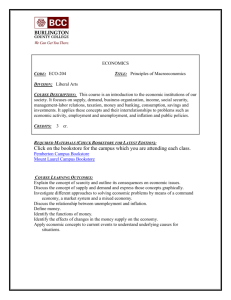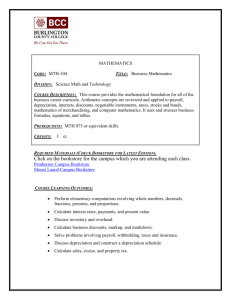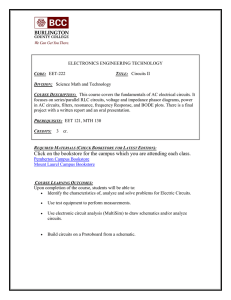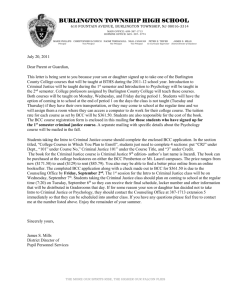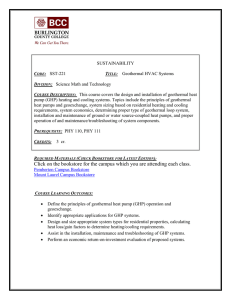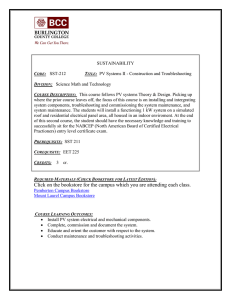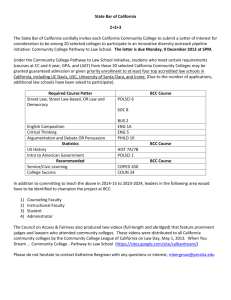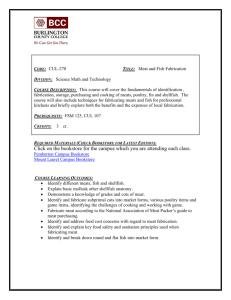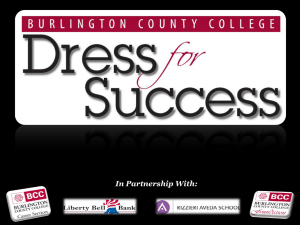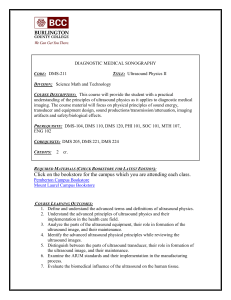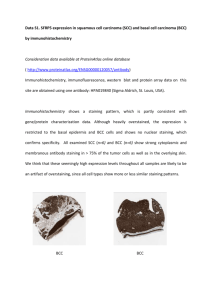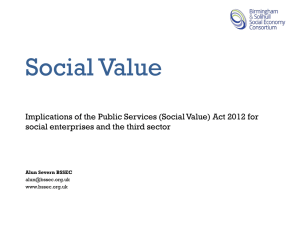CRJ 106 Introduction to the Court Systems
advertisement
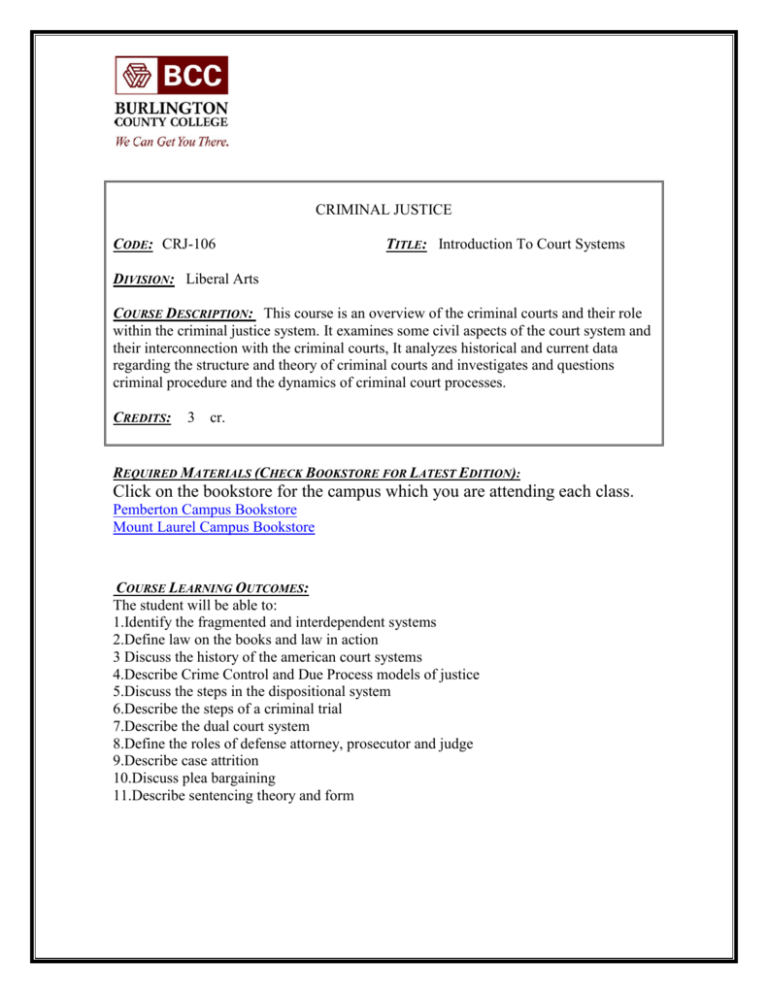
CRIMINAL JUSTICE CODE: CRJ-106 TITLE: Introduction To Court Systems DIVISION: Liberal Arts COURSE DESCRIPTION: This course is an overview of the criminal courts and their role within the criminal justice system. It examines some civil aspects of the court system and their interconnection with the criminal courts, It analyzes historical and current data regarding the structure and theory of criminal courts and investigates and questions criminal procedure and the dynamics of criminal court processes. CREDITS: 3 cr. REQUIRED MATERIALS (CHECK BOOKSTORE FOR LATEST EDITION): Click on the bookstore for the campus which you are attending each class. Pemberton Campus Bookstore Mount Laurel Campus Bookstore COURSE LEARNING OUTCOMES: The student will be able to: 1.Identify the fragmented and interdependent systems 2.Define law on the books and law in action 3 Discuss the history of the american court systems 4.Describe Crime Control and Due Process models of justice 5.Discuss the steps in the dispositional system 6.Describe the steps of a criminal trial 7.Describe the dual court system 8.Define the roles of defense attorney, prosecutor and judge 9.Describe case attrition 10.Discuss plea bargaining 11.Describe sentencing theory and form GENERAL EDUCATION OUTCOMES IN THIS COURSE: (Written and Oral * Students will logically and persuasively support their Communication: Communication points of view or findings. * Students will communicate meaningfully with a chosen audience while demonstrating critical thought. Quantitative Knowledge and Skills: Mathematics * Students will conduct investigative research which demonstrates academic integrity, originality, depth of thought, and mastery of an approved style of source documentation. * Students will analyze data to solve problems utilizing appropriate mathematical concepts. * Students will translate quantifiable problems into mathematical terms and solve these problems using mathematical or statistical operations. * Students will logically solve problems using the appropriate mathematical technique. Scientific Knowledge and Reasoning: Science Society and Human Behavior: Social Science Technological Competency or Information Literacy: Technology * Students will understand and employ the scientific method of inquiry to draw conclusions based on verifiable evidence. * Students will explain the impact of scientific theories, discoveries, or technological changes on society. * Students will demonstrate critical thinking skills in the analysis of scientific data. * Students will demonstrate a general knowledge of political, social and economic concepts and systems and their effects on society. * Students will demonstrate competency in office productivity tools appropriate to continuing their education. * Students will use critical thinking skills for computer-based access, analysis, and presentation of information. * Students will exhibit competency in library online database tools appropriate to accessing information in reference publications, periodicals and bibliographies. * Students will demonstrate the skills required to find, evaluate, and apply information to solve a problem. Historical Perspective: History * Students will demonstrate knowledge of the nature, origins, central events and significant institutions of major civilizations Global and Cultural Awareness: Diversity * Students will be able to compare and contrast cultural norms from diverse populations. * Students will be able to explain how communication and culture are interrelated. * Students will be able to examine how multicultural societies and peoples help engender a richer understanding of diverse life experiences. Ethical Reasoning and Action * Students will analyze and evaluate the strengths and weaknesses of different perspectives on an ethical issue or a situation. TOPICAL OUTLINE FOR THE COURSE: Criminal courts in controversy Crime, procedural and statutory law Rights of the accused Justice For All Movie & class discussion Constitutional issues and cases Crime Control and Due Process models Adversarial system American court structure Dual Court system Dynamics of case movement Courtroom workgroup Prosecutor Defense Attorney Judges Court visitation and paper Defendants, victims and witnesses Case attrition Bail Trial Negotiated justice and guilty pleas Sentencing COURSE ACTIVITIES: Course activities vary from course to course and instructor to instructor. Below is a listing of some of the activities students can anticipate in this course: Writing assignments: students will analyze current issues in the field using current articles from the popular press as well as library research including electronic resources databases. Speaking assignments: students will present research individually or in groups using current technology to support the presentation (e.g., PowerPoint presentation); students will participate in discussions and debates related to the topics in the lessons. Discussions may also focus on cross-cultural and legalethical dilemmas as they relate to the course content. Simulation activities: Trends and issues will analyzed for their ethical as well as social or legal significance. Students might role-play common situations for classmates to analyze. Current news articles may be used to generate discussion. Case Studies: Complex situations and scenarios will be analyzed in cooperative group settings or as homework assignments. Lectures: This format will include question and answer sessions to provide interactivity between students and instructor. Speakers: Representatives from various related fields may be invited to speak. Videos: Related topics will provide impetus for discussion. EDUCATIONAL TECHNOLOGY: Burlington County College advocates a technology enhanced teaching and learning environment. Advanced technological tools may be used in any course section to facilitate instruction. Many of our sections are web-enhanced, which means that some of your work will be submitted or completed online. Web enhancements may include online materials, grade books, testing and quizzes and assignment submission. Many students enjoy the flexibility and convenience that these online enhancements have provided, however if you have concerns about the technology involved, please speak to your instructor immediately. STUDENT EVALUATIONS: The student will be evaluated on the degree to which student learning outcomes are achieved. A variety of methods may be used such as tests, quizzes, class participation, projects, homework assignments, presentations, etc. See individual instructor’s course handouts for grading system and criteria (point value for each assessment component in course, e.g. tests, papers, presentations, attendance etc.), number of papers and examinations required in the course, and testing policy including make ups and/or retests. GRADING STANDARD: A B+ B C+ C D F Mastery of essential elements and related concepts, plus demonstrated excellence or originality. Mastery of essential elements and related concepts, showing higher level understanding. Mastery of essential elements and related concepts. Above average knowledge of essential elements and related concepts. Acceptable knowledge of essential elements and related concepts. Minimal knowledge of related concepts. Unsatisfactory progress. This grade may also be assigned in cases of academic misconduct, such as cheating or plagiarism, and/or excessive absences. For other grades, see the current BCC catalog. COLLEGE POLICIES: The current college catalog and student handbook are important documents for understanding your rights and responsibilities as a student in the BCC classroom. Please read your catalog and handbook as they supplement this syllabus, particularly for information regarding: Academic Integrity Code Student Conduct Code Student Grade Appeal Process NOTIFICATION: Burlington County College offers reasonable accommodations and/or services to persons with disabilities. The Special Populations Department offers comprehensive services to all students with any form of disability which hinders their academic success as long as the student provides appropriate documentation. Contact Special Populations at Extension 1208 at (609) 894-9311 or visit the website at: http://www.bcc.edu/pages/209.asp ADDITIONAL SUPPORT/LABS: BCC provides academic advising, student support personal counseling, transfer advising, and special accommodations for individuals with disabilities free to all students through the Division of Student Services. For more information about any of these services, visit the Parker Center on the Pemberton Campus or Laurel Hall on the Mt. Laurel Campus, or call (609) 894-9311 or (856) 222-9311, then dial the desired extension: - Ext. 1557 Academic Advisement and Counseling - Ext. 1803 Special Populations - Ext. 2737 Transfer Center Or visit the following websites: Academic Advising E-Advising Student Support Counseling Transfer Center http://www.bcc.edu/pages/206.asp http://www.bcc.edu/pages/219.asp http://www.bcc.edu/pages/274.asp?subdisp=1&subpar=206 http://www.bcc.edu/pages/185.asp BCC offers a free tutoring for all currently enrolled students. For more information regarding The Tutoring Center call Extension 1495 at (609) 894-9311 or (856) 222-9311 or visit the Tutoring Center Website at http://staff.bcc.edu/tutoring/ Annual Review 2011-2012 DS
